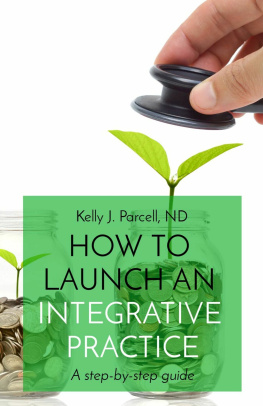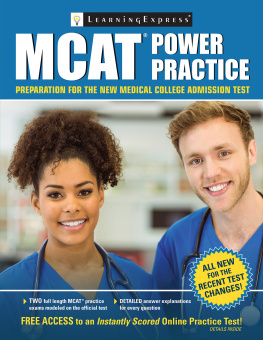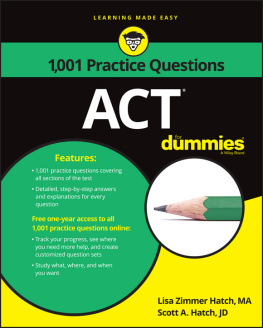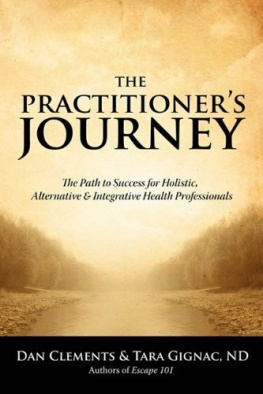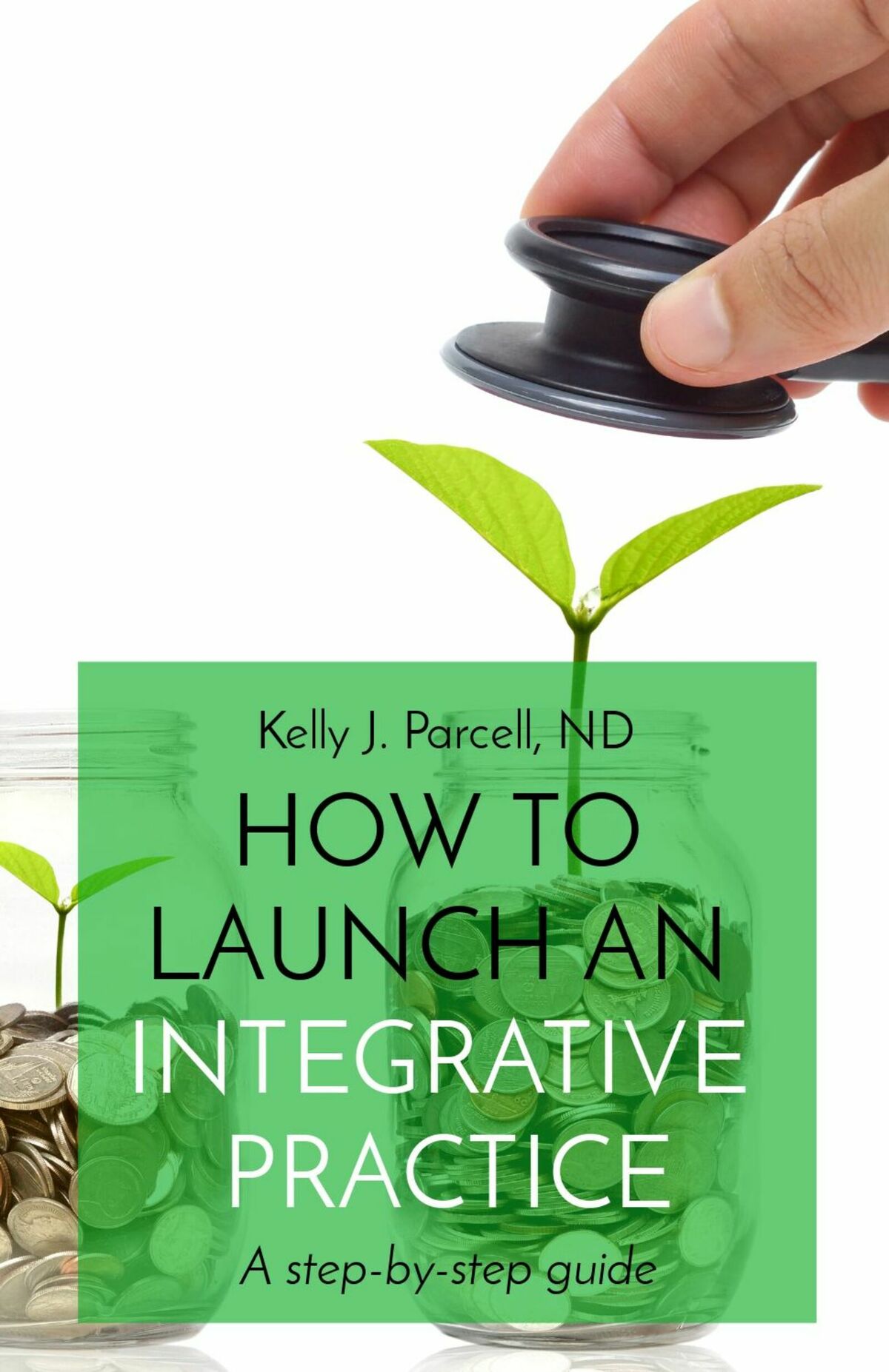My husband, business partner, colleague, friend, and teammate in this life.
We are more powerful together.
If youre reading these words, you are probably considering starting your own integrative practice.
How are you feeling: optimistic? Hopeful? Excited? A little intimidated? A lot intimidated?
Its okay. Youre not alone. Thats why I decided to write this book, to help ease your fears and minimize intimidation. I promise, what youre thinking of doing is doable!
You have questions.
Maybe youve been in practice a long time. Maybe youre new to practice. Maybe youre somewhere in between. Whatever your level of experience, welcome. You picked up this book for a reason: you want to know if theres a better way to practice than what youre doing now.
Youre probably wondering how difficult (or easy!) it might be to make the transition to your own operation. Youre curious to know whats involved, if you have the skills and resources to take on the task, and how hard it is to get them if you dont have them already.
Most of all, you want to know how to make the decision and, if its the right path for you, how to go about bringing it into reality.
What is an integrative practice?
An integrative practice is known by many names such as alternative medicine, complementary medicine, or healing-oriented medicine. Theyre all the same. The difference is defined by your focus, skills, and priorities.
I am a naturopathic doctor. From day one of naturopathic medical school, we learn that the body is connected as mind, body, and spirit. We are trained on the foundations of medicine as all medical students are in terms of anatomy, physiology, neurology, histology, biochemistry, psychology, and so forth. In addition, we learn about botanical medicine, homeopathy, nutriceuticals (dietary supplements), pharmacology, drug/nutrient interactions, intravenous therapy, psychology, manual therapy (basic manipulation techniques), hydrotherapy, and more. But most importantly we practice based on a set of principles that guides our approach to care. These principles unite those of us who practice in the alternative medical model:
The Healing Power of Nature (Vis Medicatrix Naturae): Naturopathic medicine recognizes an inherent self-healing process in people that is ordered and intelligent. Naturopathic physicians act to identify and remove obstacles to healing and recovery, and to facilitate and augment this inherent self-healing process.
Identify and Treat the Causes (Tolle Causam): The naturopathic physician seeks to identify and remove the underlying causes of illness rather than to merely eliminate or suppress symptoms.
First Do No Harm (Primum Non Nocere): Naturopathic physicians follow three guidelines to avoid harming the patient:
Utilize methods and medicinal substances which minimize the risk of harmful side effects, using the least force necessary to diagnose and treat;
Avoid when possible the harmful suppression of symptoms; and
Acknowledge, respect, and work with individuals self-healing process.
Doctor as Teacher (Docere): Naturopathic physicians educate their patients and encourage self-responsibility for health. They also recognize and employ the therapeutic potential of the doctor-patient relationship.
Treat the Whole Person: Naturopathic physicians treat each patient by taking into account individual physical, mental, emotional, genetic, environmental, social, and other factors. Since total health also includes spiritual health, naturopathic physicians encourage individuals to pursue their personal spiritual development.
Prevention: Naturopathic physicians emphasize the prevention of disease by assessing risk factors, heredity and susceptibility to disease, and by making appropriate interventions in partnership with their patients to prevent illness.
Naturopathic medicine is inherently integrative, bridging or integrating alternative therapies with conventional approaches. Whether your potential practice is one practitioner who has knowledge of alternative and conventional approaches or two or more providers who team up to offer both aspects of care, your practice will be an integrative practice.
But theres another aspect to consider, one that for most practitioners is the foundation of their interest. An integrative practice creates connections between approaches to patient care, but its something else, too.
Its a practice that puts the patient at the center of care.
Its a practice where the mental, emotional, and physical health of the patient are primary concerns, never secondary.
Its a practice that calls on a hierarchy of treatment methods, beginning treatment with the least invasive measures.
As you can see, when I speak of an integrative practice, Im talking about not just the practice of medicine but also our priorities of what we do. Thats important, because a lot of things can crowd out our direct work with patients.
Having a practice requires dealing with insurance coverage, meeting (and fighting!) institutional quotas, handling pharmaceutical sales, and much more. An integrative practice cannot eliminate all those things, nor should it. Many elements of practice that do not involve direct patient care bring value to the process. The difference we find in an integrative practice is that we put priorities in their appropriate place their best place, meaning that everything that is not directly related to patient care is secondary or lower, never primary.
Can I really start my own integrative practice with just this book?
Yes, you can.
That doesnt mean it will be as easy as a trip to the grocery to pick up whats on your list. But starting your practice doesnt have to be as difficult as you may be imagining it will be.
Yes, youll need to learn to do things that may be unfamiliar.
Yes, youre still going to have to do things that have less to do with the practice of medicine and more to do with running a business and navigating third-party bureaucracies.
Yes, youll be taking over several things that others are now doing on your behalf.
But its a relatively short list of new obligations, and the benefits you will enjoy from taking them on will far outweigh the challenge of the learning curve to get there.
Even better, the time you spend on these new tasks will be more than compensated for in the additional time you will gain to spend with patients, to pursue other professional interests, or to have for your family, your friends, and yourself.
How do I know? Ive been there myself, right where you are now.
Both my husband and I are naturopathic doctors (NDs). When we started our own integrative practice, we felt like we were treading in territory that no one had ever explored. Of course, that wasnt the case, but you wouldnt know it from the literature; rather, from the lack of literature. I found little encouragement and even less of what I needed most: experienced guidance on how to decide whether such a practice was right for us, how to launch it if we did decide to go ahead, and how to keep it going.

